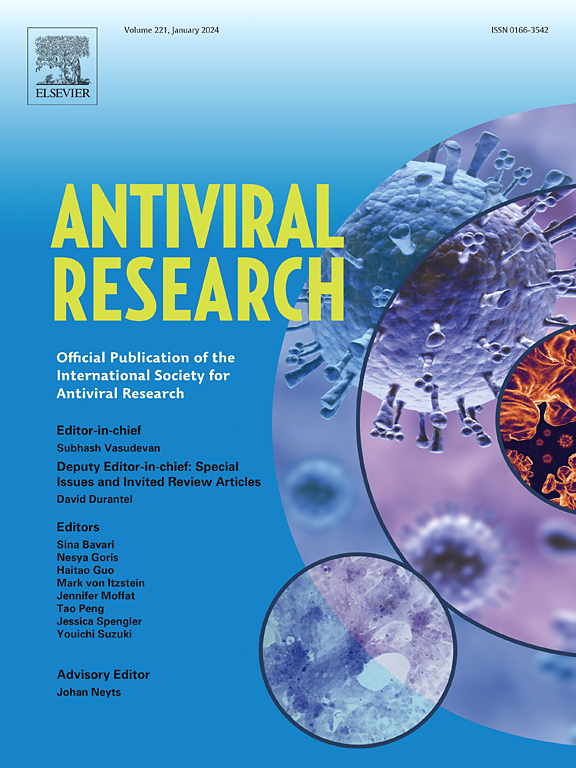抗人类DNA病毒和逆转录病毒的表观遗传药物
IF 4.5
2区 医学
Q1 PHARMACOLOGY & PHARMACY
引用次数: 0
摘要
表观遗传药物提供了一种有吸引力的策略来对抗DNA病毒和逆转录病毒,这些病毒建立了模仿染色质化宿主基因组的慢性感染。抑制病毒复制的直接抗病毒药物(DAA)可减少病毒血症。然而,它们不能根除伪装成宿主染色质的病毒DNA核储存库,这使得病毒基因组得以维持和再激活,并可能带来严重的临床后遗症。由于基础表观遗传和转化研究的努力取得了长足的进步,我们进入了一个针对持久性或潜伏性DNA病毒和逆转录病毒感染的药物开发的新时代,包括针对被病毒劫持的宿主表观遗传机制的药物。表观遗传药物调节病毒与宿主的军备竞赛,通过重塑细胞内的表观遗传景观、沉默持续的病毒基因组或在DAA存在的情况下诱导潜伏宿主的大量同时重新激活来加强宿主的防御。本文旨在通过分析表观遗传药物治疗逆转录病毒人类免疫缺陷病毒(HIV)和人类t细胞嗜淋巴病毒-1 (HTLV-1)、副病毒乙型肝炎病毒(HBV)和疱疹病毒的临床前和临床研究,强调该方法的成功、进展和挑战。本文章由计算机程序翻译,如有差异,请以英文原文为准。
Epigenetic drugs against human DNA viruses and retroviruses
Epigenetic drugs offer an attractive strategy against DNA viruses and retroviruses that establish chronic infections mimicking the chromatinized host genome. Direct-acting antiviral (DAA) drugs that inhibit viral replication decrease viremia. However, they fail to eradicate the nuclear reservoirs of viral DNA that masquerade as host chromatin, which enable viral genome maintenance and reactivation with possible severe clinical sequelae. Owing to the strides in basic epigenetic and translational research endeavors, we enter a new era of drug development against infections with persistent or latent DNA virus and retroviruses including drugs that target the host epigenetic mechanisms hijacked by the viruses. Epigenetic drugs modulate the virus-host arms race, fortifying host defenses by remodeling the epigenetic landscape inside cells, silencing persistent viral genomes, or inducing massive simultaneous reactivation of latent reservoirs in the presence of DAA. This review aims to highlight the successes, progress, and challenges of this approach by analyzing the emerging preclinical and clinical studies of epigenetic drugs against the retroviruses human immunodeficiency virus (HIV) and human T-cell lymphotropic virus-1 (HTLV-1), the pararetrovirus hepatitis B virus (HBV), and the herpesviruses.
求助全文
通过发布文献求助,成功后即可免费获取论文全文。
去求助
来源期刊

Antiviral research
医学-病毒学
CiteScore
17.10
自引率
3.90%
发文量
157
审稿时长
34 days
期刊介绍:
Antiviral Research is a journal that focuses on various aspects of controlling viral infections in both humans and animals. It is a platform for publishing research reports, short communications, review articles, and commentaries. The journal covers a wide range of topics including antiviral drugs, antibodies, and host-response modifiers. These topics encompass their synthesis, in vitro and in vivo testing, as well as mechanisms of action. Additionally, the journal also publishes studies on the development of new or improved vaccines against viral infections in humans. It delves into assessing the safety of drugs and vaccines, tracking the evolution of drug or vaccine-resistant viruses, and developing effective countermeasures. Another area of interest includes the identification and validation of new drug targets. The journal further explores laboratory animal models of viral diseases, investigates the pathogenesis of viral diseases, and examines the mechanisms by which viruses avoid host immune responses.
 求助内容:
求助内容: 应助结果提醒方式:
应助结果提醒方式:


